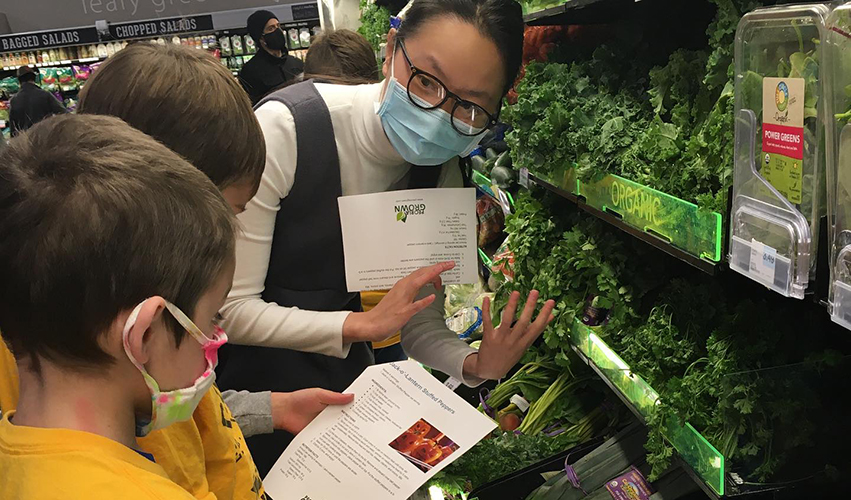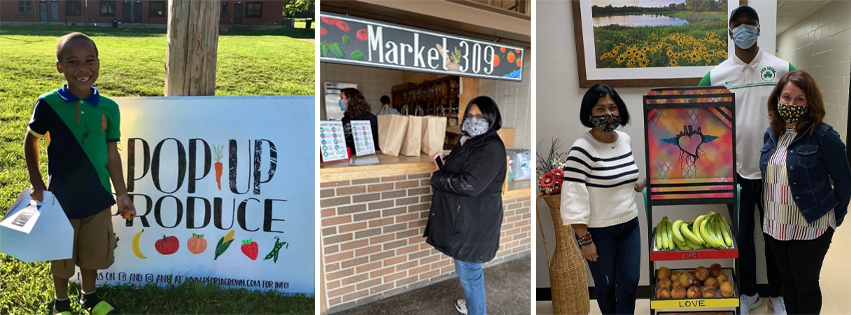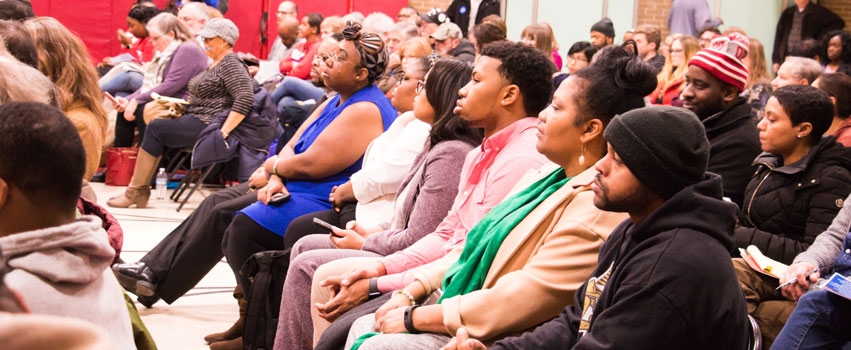Learn. Cook. Eat. Repeat.

The last year has been a busy one for Peoria Grown, a grassroots organization dedicated to addressing food insecurity in Peoria’s food deserts. Before the pandemic, you may have seen them around town conducting educational tours of local farmers markets, community gardens and grocery stores—or seen their volunteer dietitians teaching nutrition and cooking classes at community centers and churches. You may have even come across their eye-catching Art Snack fruit stands, created by local artists from Big Picture—a fun way to provide easy access to free, fresh fruit at local schools.
Peoria Grown’s efforts got started in 2018 as part of former Illinois Senator Chuck Weaver’s community leadership initiative. After months working within the community, our team members, made up solely of volunteers, identified a lack of dietary education and access to fresh produce in zip codes prone to food insecurity as two significant issues not being addressed in Peoria. These problems are particularly acute in neighborhoods that must rely on convenience stores and gas stations after major grocery stores moved out of the area.
Our Mission
Peoria Grown believes in three fundamental principles:
- Everyone should have access to affordable, healthy food.
- Education is the key to helping individuals be self-sufficient and improve community wellness.
- People must be able to make choices about their own nutrition and health to encourage self-reliance.
Our mission is to address food insecurity issues impacting the city through improved coordination of resources; access to affordable, healthy food with an emphasis on fresh produce; and education on nutrition and making healthy food choices. The COVID-19 pandemic put these efforts into overdrive.
“Suddenly, there was such tremendous need due to the economic pressures placed on families by the pandemic—and students were not physically in schools to receive meals,” elaborates Abby Green, Peoria Grown’s strategic marketing officer. “Because we are a small, grassroots organization, we were able to quickly switch gears and ramp up our programs to address these emerging needs, while increasing the amount of food distributed at no cost through our cooking and nutrition classes.”
During the pandemic, Peoria Grown has launched multiple programs to provide food support in the community. Initiatives like Fruit Bags To-Go and the Pop-Up Mobile Produce Pantry—as well as collaborative efforts to distribute healthy snacks and fruit smoothies at local events—placed emphasis on providing fruit and vegetables to residents where and when support was needed.

Since the onset of the pandemic, we have distributed nearly 8,500 bags of fruit and more than 700 bags of vegetables (over 7,000 pounds of fresh produce in total) to nonprofits, schools and community centers. The produce is provided at cost by Hy-Vee on Sheridan Road, which has also conducted over 80 cooking classes with more than 720 participants.
“We discovered a misconception that healthy food should take a backseat whenever people are in need or when there is an emergency, like the pandemic,” Green adds. “Healthy food does not have to be more expensive—and it builds good habits that disrupt the cycle of food insecurity that plagues our community, particularly for children who are forming lifelong eating habits.”
Removing Systemic Barriers
It is well known that people who are food-insecure are likely to face significant health issues. Health professionals stress that diabetes, heart disease, high cholesterol, obesity, high blood pressure, dental issues and other chronic illnesses can be managed by a healthy diet and lifestyle.
Blanca Miller, chair of undergraduate nursing at Methodist College and a Peoria Grown board member, echoes this sentiment. “We have learned people who are food-insecure are likely to face major health issues and are often unsure of how exactly diet affects their health,” she notes. “Our approach to this issue is to democratize wellness. We are acting to remove systemic barriers that prevent individuals and families from getting access to nutritious food they can afford and the health education they need and want in order to improve their lives.”
This January, Peoria Grown, in partnership with the Peoria Park District, opened Market 309 and its Wellness and Nutrition Hub. The market, housed within the Logan Recreation Center, provides fresh produce at a cost cheaper than grocery stores. It is open to residents of the 61605 zip code every Sunday from noon to 3pm. The Wellness Hub serves as a central community space providing nutrition, health, and food-related services and education to the Peoria Southside community.
“This is really an exciting time for us,” enthuses Frannie Heine, a Peoria Grown board member and volunteer. “We are starting to see some regulars coming in every week to get their favorite fruits and vegetables, and volunteers from all around the city are pitching in. Last week, we heard from a resident telling us how thankful she is that she can afford to purchase more fresh produce for her health condition.”
Peoria Grown’s goal is to replicate Market 309 in as many neighborhoods as possible. If you are interested in volunteering or contributing to our efforts, visit peoriagrown.com and click on the “Get Involved” tab. PM
Julie Eliathamby is the founder and executive director of Peoria Grown. Connect with them on Facebook or Instagram @peoriagrown, call (309) 363-3200 or email peoriagrowninfo@gmail.com.
